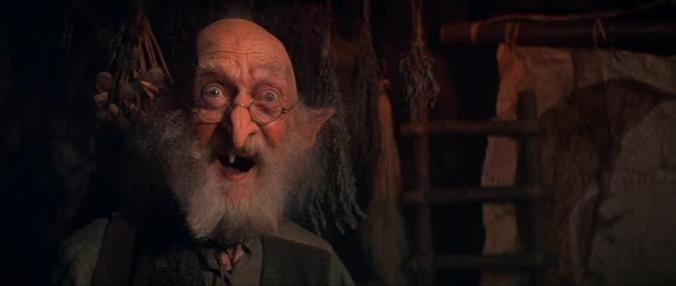
If you recognize the little old man in the picture above, you probably were a child in the 1980s. He is the excited little man who helps Atreyu understand the oracles in The Never Ending Story. His name is Engywook (I looked it up), and he constantly argues with his wife. However, he loves his research into the Southern Oracles, and when Atreyu comes to conquer the riddles of the oracles, Engywook is overjoyed to share is knowledge with the young man.
Engywook looks a lot like one of my favorite people: Richard Maxwell. Professor Maxwell taught my senior seminar class in college focused on lyric poetry. I’m not trying to be unkind when I say he looks like this toothless movie character; it’s really just the truth. But, just to clarify, Professor Maxwell had all his teeth and didn’t have pointy ears. Otherwise, they are mirror images of each other.
Professor Maxwell’s class was in the darkest and oldest building on campus. Made of flowerpot tan brick and burnt mustard carpeted classrooms, the entire structure screamed 1960s. One day while walking down the hallway, Professor Maxwell was walking in front of me in his Converse low top sneakers. He stopped to admire a particular corner of the building. The sun was streaming through the window, and he walked up and placed the palm of his hand on the wall as if to try to soak up the heat from the brick. I walked passed him. His eyes were shut, and he was smiling.
Any day you could see Professor Maxwell talking with students. He’d be sitting on the grass speaking to a small group, and then he’d be at the student union in a comfy chair having a different conversation with someone else. Then a few hours later he’d be in the cafeteria eating lunch with another student.
I didn’t have a connection with Professor Maxwell like other students did. I firmly believed professors were not to be socialized with, and I wanted my coursework to be a reflection of my work and not the result of a personal connection. It seemed insincere. Professor Maxwell liked my writing, he liked my poetry and helped me get a few poems published.
But, that’s not why he is one of my favorite people.
In class, Professor Maxwell would take his book of Russian poetry, fan it open, and place it on his head like a hat. He’d lean in close to a person, making direct eye contact and caressing his white beard, and he’d command, “Say something brilliant about this poem.” Then he would wait. Eventually the person would say something, and Professor Maxwell would exclaim, “Brilliant! Brilliant!” and then he would take what the person said and mold it into something actually brilliant. That was his gift: He saw potential greatness in every poem, every person, every brick. It just needed to be recognized and flushed out.
The man lived his joy. I graduated and moved on, Professor Maxwell went on to teach classes at Yale, and then one day his obituary appeared in the alumni magazine. A lot of students didn’t really appreciate him. They saw him as flighty and incompetent. His grading was haphazard; his discussions, abstract. No one could argue that he didn’t love literature, though. I didn’t really appreciate him as I should have while in school. It’s only now that I recognize how hard it is to hold onto the life view that Professor Maxwell embodied. Cynicism, sadness, frustration, regret, and blame are all too easy to fall into in our world; Professor Maxwell understood those emotions and how they functioned, but they did not rule him. Ever.
I have very few positive memories from college, but he is one of them I didn’t anticipate cherishing after all these years. I cut out his obituary and framed it. It sat on my work desk for 15 years, and now it is on my fireplace mantle. He was just someone I had the honor of knowing, but he has turned out to be an inspiration. And, for some reason, it conjures a poem I really like by e.e. cummings:
anyone lived in a pretty how town
(with up so floating many bells down)
spring summer autumn winter
he sang his didn’t he danced his did
“He sang his didn’t he danced his did.” He really did, and I hope to be more like him.